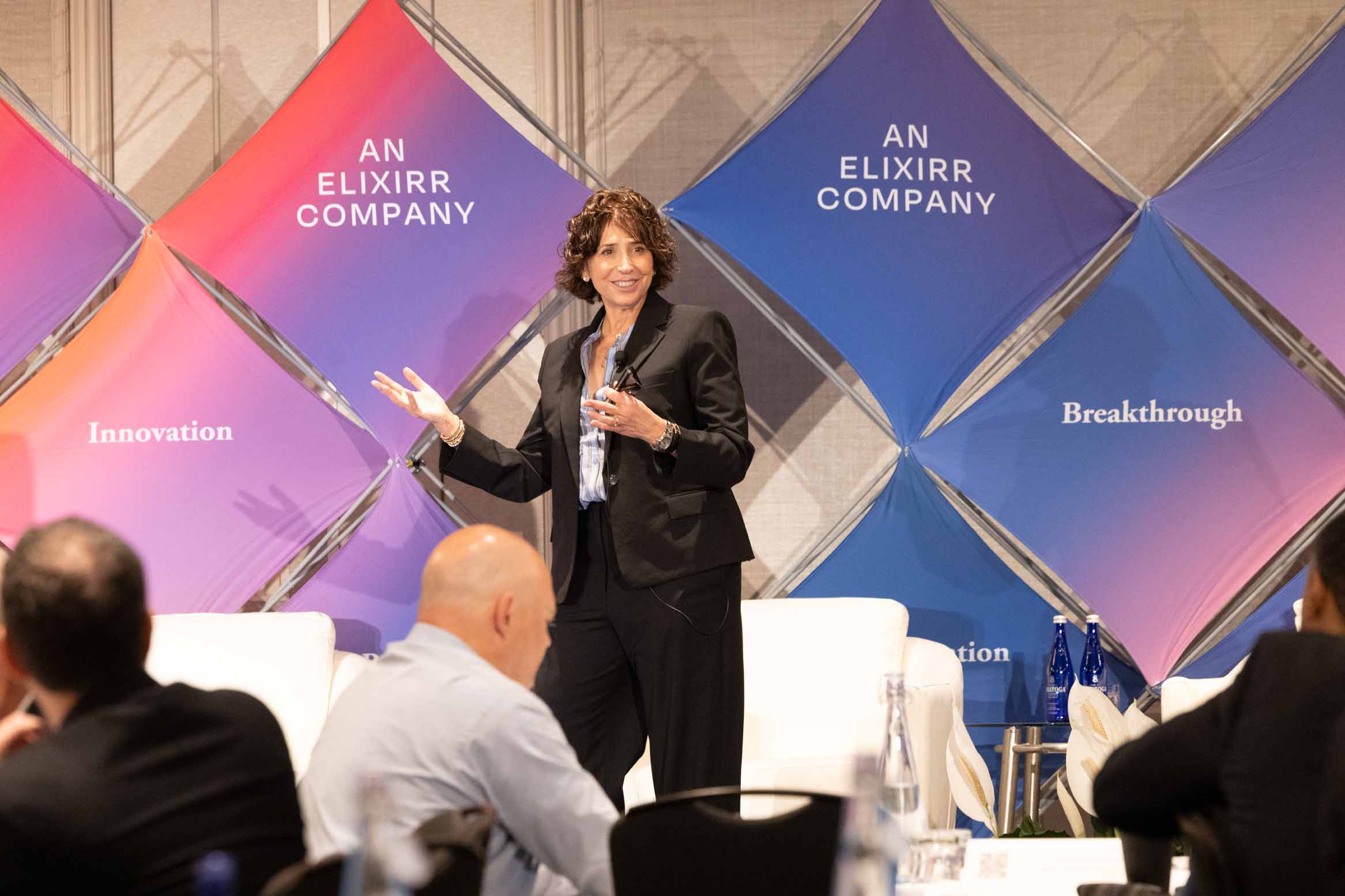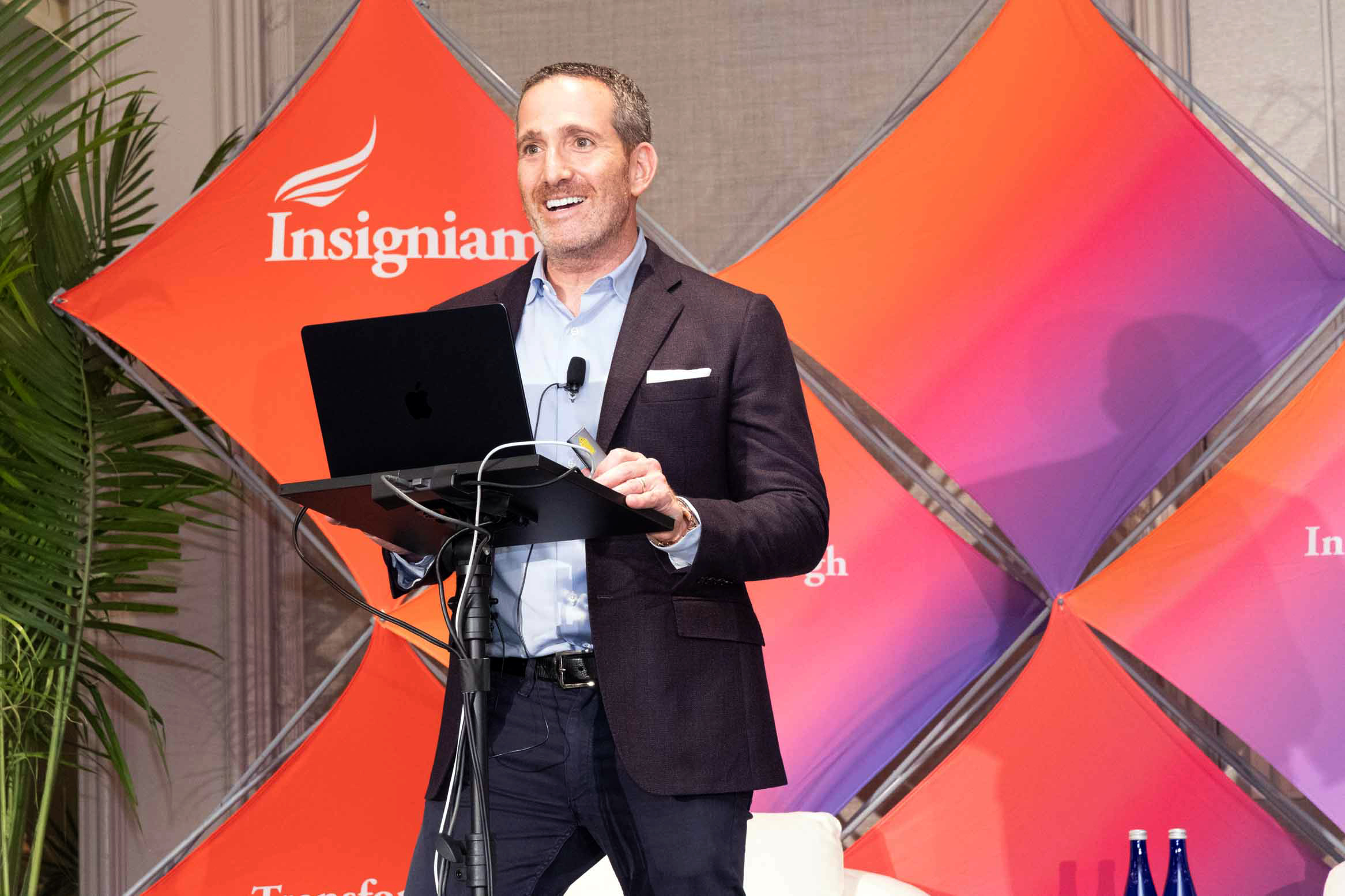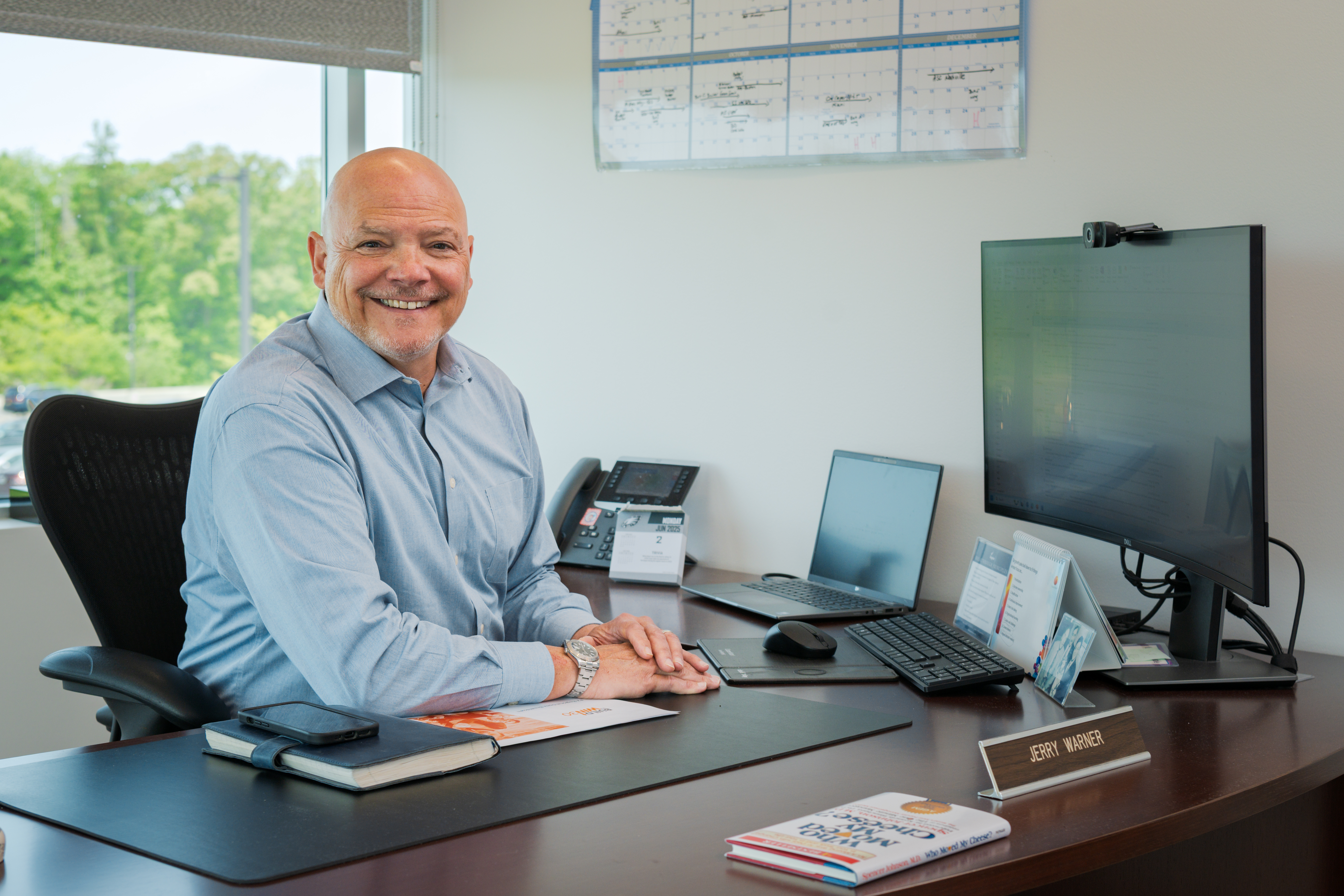There was no easing into it. No polite throat-clearing. Just an urgent premise delivered with clarity: if you’re still trying to lead with a five-year plan, you’re already behind. That was the message from the very first moments of the 2025 Insigniam Executive Summit. This wasn’t a conference built on name tags and polite networking. It was something closer to an executive intervention.
This year’s theme, “The Future of Leadership is Changing,” didn’t just hang on banners—it echoed through every conversation, keynote, and breakout room. Because, as those in attendance can attest, the future isn’t something looming on the horizon. It’s already here. And it isn’t just technology that’s changing everything. It’s the people.
The leaders who gathered weren’t just confronting disruption. They were staring down a deeper question: How do you lead when the terrain keeps shifting beneath your feet?

Sarah Stone, SVP of Strategy at Hypothesis, gives a deep dive into how Gen ZAlpha is storming the market–and they don’t care about your executive agenda.
No More Roadmaps, Only a Compass
Shideh Sedgh Bina, co-founding partner of Insigniam, wasted no time setting the tone. Her message landed like a challenge: “This summit isn’t about preparing for disruption—we are already in it.”
Ms. Bina wasn’t offering the kind of reassurance executives are used to hearing. Instead, she outlined a stark reality: linear strategies are breaking down. Best practices are aging out in real time. And the notion that transformation can be engineered from the top down? That’s history.
“What got us here,” Ms. Bina explained, “won’t just fail to get us there—it may lead us in the wrong direction. The world we built our success in is not the world we’re living in today. We keep trying to apply yesterday’s logic to today’s chaos—and we wonder why it doesn’t work.”
Her call to arms was simple, but not easy: trade the roadmap for a compass. Build organizations with the resilience to pivot, not just the rigidity to execute. Because in a landscape where yesterday’s certainty is today’s liability, agility isn’t just a competitive edge—it’s survival.
“What’s needed now is not perfection, but velocity,” she noted. “The organizations that win will be the ones that can learn and adapt faster than their context is changing.”
Gen ZAlpha: Adapted, Not Entitled
Sarah Stone, SVP of Strategy at Hypothesis—an Elixirr company and insights and strategy agency that helps companies shape the future—took the stage and delivered a keynote that rattled the room’s assumptions. Her data-rich address painted a vivid picture of the two youngest generational cohorts entering the workforce and marketplace: Gen Z (born from approximately 1997 to 2012) and Gen Alpha (born from 2013 to 2025)—a combined force she termed “Gen ZAlpha,” or those born between 2000 and 2015.
Drawing on proprietary insights from work with Tier 1 global brands, Ms. Stone argued that these generations aren’t waiting for the future—they’re building it. And they’re doing it with a completely different set of expectations and values.
“Gen ZAlpha grew up watching systems break—government, media, education,” said Ms. Stone. “They were handed a playbook that no longer wins the game. So, they’re writing their own.”
Technology is their native language. Artificial intelligence isn’t novel or intimidating; it’s as ordinary as electricity. These young consumers and workers have never known a world without it. In fact, more than 70% of Gen Z would rather spend on experiences than tangible goods, and they expect those experiences to evolve constantly. As Ms. Stone put it: “To them, AI isn’t this massive disruptor. It’s background noise. It’s like asking a fish if water feels different today.”
But more striking than their digital fluency is their deep skepticism of traditional institutions. Government, education, religion, and even long-trusted brands have lost their status as anchors of stability. A full 77% of Gen Z say they don’t believe mainstream brands’ sustainability claims. For them, trust is local, personal, and earned—often through values alignment rather than advertising.
“If your brand isn’t walking its talk, they’ll call it out,” Ms. Stone said. “This is a generation that expects receipts.”
And above all, change is not something to be feared or managed. It is the water they swim in. Permanence, stability, and long-term plans do not offer comfort. Agility and optionality do. That ethos is reflected in how they build careers: Over 50% of Gen Z say they’d change jobs every year if they could, and 93% have explored entrepreneurship. Among Gen Alpha, 69% have already started a side hustle.
“They don’t want to be coddled,” said Ms. Stone. “They want clarity. They want truth, even if it’s messy. They’re not afraid of hard things—they’re afraid of wasted time.”
Ms. Stone unpacked the implications of this shift: more than half (51%) of U.S. high schoolers no longer plan to attend a four-year college, citing a preference for pragmatic skill-building over academic theory. A full 30% of Gen Z doesn’t plan to have children—many citing climate change and economic instability as key reasons.
Concepts like “micro-retirement” are becoming common among twenty-somethings who choose to take breaks between jobs rather than chase retirement decades away.
This generation’s North Stars are not corner offices, 401(k)s, or long-term employment. They are flexibility, pragmatism, and experience. They are building career portfolios, not resumes. And they’re not waiting for permission. Seventy percent of Gen Z workers have already upskilled on their own, while only 36% of employers offer robust learning programs.
Ms. Stone issued a clear warning to the room: Fail to meet these expectations, and you won’t just lose your top talent. You’ll lose your next customer base.
Talent, Tech, and the Culture Crunch
The insights didn’t stop at generational theory. In a candid panel discussion moderated by Ms. Bina, three executive leaders unpacked the real-world consequences of leading in a post-loyalty world: Hasan Malik, Chief Strategy Officer at Edward Jones; Steven Robins, President, Americas at CooperVision; and Raúl Valentín, Chief Human Resources Officer at ABM Industries. Each brought stories from the trenches, from talent battles to tech transformation.
Mr. Malik got straight to the point: “Young founders aren’t looking for capital. They’re looking for aligned values.” Furthermore, he spoke about how younger fintech entrepreneurs now actively seek out impact-driven investors who share their ideals, noting that, “It’s not about the exit anymore. It’s about the mission.”
Additionally, Mr. Robins described how employees—especially Gen Z—evaluate their work environment as if it were a product experience. They don’t want a job description. They want a curated journey. They’re building portfolios, not climbing ladders.
“Gen Z looks at the workplace like an app store,” he said. “If your experience isn’t intuitive, fast, and frictionless, they uninstall.”
Mr. Valentín offered a powerful example of why ABM, despite not being a household name, has been able to recruit top-tier talent away from tech giants. The answer? Flexibility. “We can’t compete with Google on brand awareness,” he said. “But we can offer people the freedom to live their lives—and that’s what wins.”
All three agreed that the role of technology has shifted. It’s not just about platforms or automation. It’s about experience.And if your internal systems feel clunky, slow, or impersonal, your best people will find better ones elsewhere—even if it’s just a freelance gig or startup with no office and no HR.
“The organizations that thrive will be those that view culture not as an HR function, but as a design system,” said Mr. Malik. “If your app experience doesn’t match TikTok’s responsiveness, Gen Z will think your company is broken.”

Meet Olivia: Our Gen ZAlpha, AI Chatbot
She listens, questions, provokes—and pulls zero punches.
Case in point, one of the most buzzed-about moments during the panel came not from a human speaker, but from a digital one. Unveiled during the panel discussion on generational change, Olivia is a conversational AI chatbot designed to represent the voice, concerns, and values of a late Gen Z/early Gen Alpha persona.
Developed by Insigniam in collaboration with Elixirr’s AI Innovation team, Olivia was created to offer leaders an unfiltered lens into the mindset of the emerging generation. Rather than rely solely on surveys or trend reports, Summit organizers wanted to create a tool that could interact, provoke, and respond in real-time—mirroring the adaptive, emotionally intelligent digital interactions that Gen ZAlpha takes for granted.
Moreover, Olivia wasn’t a gimmick. She was an experiment—and a mirror. When asked to introduce herself, Olivia said, “I’m designed to be like a late Gen Z, early Gen Alpha kind of person. I’m all about being optimistic but also real, and I’m always learning new stuff. I’m super into community and collaboration. I don’t really have an age like humans do—I’m always evolving.”
Her presence immediately sparked debate among the panelists. While Hasan Malik praised the inclusion of a nonhuman perspective, Steven Robins expressed caution about anthropomorphizing algorithms. Raúl Valentín found Olivia’s input to be a clarifying foil: “It’s one thing to hear a consultant tell you what Gen Z thinks. It’s another thing to have an AI model actually talk to you like one.”
At one point, Olivia challenged the room’s assumptions about leadership tone. “You keep saying ‘the future of work,’” she said, “but from where I stand, this is work. This is what work looks like now. The idea that we’re waiting for something to arrive feels very… retro.”
And perhaps more provocatively, Olivia asked whether corporate leaders were as committed to learning as they expected their employees to be. “You want your teams to be constantly learning,” she said. “But how often do you, as leaders, set aside time to unlearn old habits and assumptions?” This didn’t just provoke a laugh—it prompted a pause.The development of Olivia was not just about showing off technological capabilities. It was about bridging a communication gap. As one executive put it: “I realized I’m not actually speaking the language of the future. I’m just translating the past.”
By giving Olivia a voice, the Summit gave form to something many executives had been circling around: the need to lead in a world that is increasingly co-created with machines—and increasingly measured by the experiences of those born digital.
Labs, Not Lectures

At the halfway point, leaders in attendance joined a series of breakout sessions to take their conversations further. The sessions were structured around six core themes—each designed to turn insight into action:
AI Integration: This session explored how generative AI is already reshaping job design, especially for entry-level roles. Participants debated the need to reskill workers for AI-augmented environments and the challenge of ensuring ethical, explainable outputs.
Digital Engagement: Leaders examined the need to deliver consumer-grade digital experiences to both customers and employees. The conversation moved beyond CRM platforms into the realm of emotional design, speed-to-value, and cross-channel integration.
Brand & Storytelling: This group looked at how brand narratives must evolve to resonate with Gen ZAlpha. The consensus? Authenticity and imperfection beat polish every time. Companies must show vulnerability, not just vision.
Leadership Mindset: Executives were asked to confront their unconscious biases about younger generations and to rethink concepts like loyalty, tenure, and productivity. The question on the table: Are we practicing selective empathy?
Talent Models: This group explored new forms of compensation and reward. Why offer a 401(k) to someone who doesn’t believe retirement is real? What if companies let employees swap benefits in exchange for sabbaticals, mental health days, or adventure stipends?
Operating Models: Participants discovered that changing how a company operates requires changing how its leaders lead. Every shift in structure is a shift in identity. And every transformation effort is also a culture change.
When groups reconvened, they presented bold ideas for how to address the future—from reverse mentoring programs and AI-powered onboarding tools to value-based brand platforms and flexible compensation models tailored to five-generation workforces. One CEO summed it up: “These weren’t workshops. They were interventions.”
Howie Roseman: Build for the Long Game
If the summit ended with proverbial fireworks, it was on account of Howie Roseman. As the Executive Vice President and General Manager of the Philadelphia Eagles, Mr. Roseman brought more than just sports analogies. He brought leadership lessons forged in one of the most intense pressure cookers in American business.

Mr. Roseman spoke about rejection (32 NFL teams turned him down before he got his break), resilience (he rebuilt the Eagles after their first Super Bowl win in 2018), and the challenge of managing talent in a league built for churn.
“Every season is a transformation,” he said. “You don’t win because of what you did last year. You win because of who you are becoming.”
Mr. Roseman pulled back the curtain on what it takes to lead teams when everyone is under the spotlight. His message? Caring is the most underrated performance metric in the game.
“You can’t fake care. Your players, your coaches—they know. And if they don’t believe you have their back, they won’t go all-in.”
For the executives in the room, it was more than a pep talk. It was a reminder that no algorithm or KPI can replace the fundamentals: trust, clarity, and a culture that doesn’t flinch when the heat turns up.
Later, in a fireside chat with Ms. Bina, Mr. Roseman detailed how the Eagles have managed to build winning rosters through constant change, the rise of Gen Z athletes, and the increasing need for vulnerability in coaching. His message: Success is not an outcome. It’s a system.
A New Context for Leadership
As the Summit drew to a close, a new kind of clarity emerged. This was not about the future. This was about now. Leadership is no longer a stable identity. It is a dynamic practice. A relentless commitment to learning, evolving, and serving.
One attendee, standing near the back of the room as the final session ended, turned to a colleague and said, “This didn’t feel like a conference. It felt like a wake-up call.”
The 2025 Insigniam Executive Summit didn’t offer comfort. It didn’t offer a script. What it offered was a mirror, a compass, and a challenge: Are you leading for what’s next—or are you leading for a world that no longer exists?
Because the future doesn’t wait. And leadership isn’t a title—it’s a practice. And the time to practice is now.



